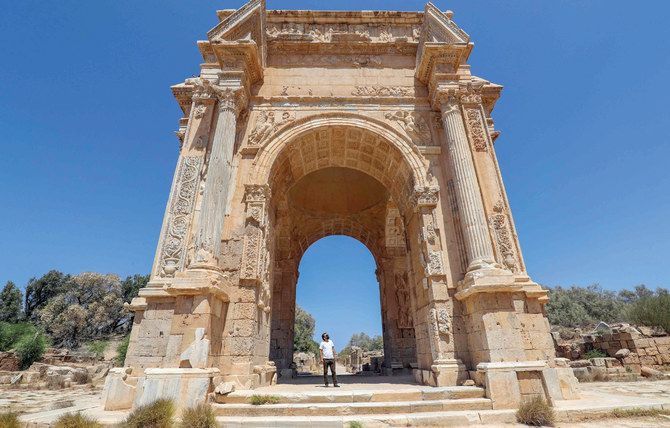AL-KHUMS, Libya: Once among the Roman Empire’s most beautiful cities, Leptis Magna lies neglected and shunned by tourists after a decade of war, but some see its potential for rebirth.
There is no queue at the gate and only a handful of visitors, almost all Libyans, wander among the imposing ruins at the UNESCO World Heritage site.
Visiting the area, a former Roman outpost on the south coast of the Mediterranean, is “a voyage in time, a dive into history,” enthuses Abdessalam Oueba, a Libyan visitor in his 60s.
Founded by the Phoenicians then conquered by Rome, the city was the birthplace of Septimius Severus, who rose to become emperor from 193 until 211.
The ruler waged military campaigns across Europe and into modern-day Iraq before dying in York, England, far from the hometown on which he had lavished resources.
Perched on a hillside with a striking view of the Mediterranean, the well-preserved ruins include a large basilica, a racecourse and a theater seating up to 15,000 spectators on arched terraces overlooking the sea.
Among the few visiting tourists are Ihab, from Tripoli, who made the 120-km trip to show his children a site he had visited during his own childhood.
“Leptis Magna is beautiful, the most beautiful Roman site outside Italy,” the 34-year-old doctor said under a clear blue sky. “Yet it’s barely been discovered.”
The violence that wracked Libya after the 2011 revolt that toppled former ruler Muammar Qaddafi stirred fears for the ancient ruins, prompting UN cultural agency UNESCO to place them and four other Libyan sites on a list of global heritage in danger.
But so far, the areas have been mostly spared from the fighting, which has largely paused since an October 2020 ceasefire.
“There haven’t been any direct attacks or threats against Leptis Magna, despite the conflict,” said Azeddine Al-Fakih, head of the site’s antiquities department.
Yet it faces other threats: A lack of resources and government support.
“In 2020, we were finally able to launch projects that should have been finished 50 years ago,” he said, listing toilet facilities, offices and a perimeter fence.
“But archaeological digs have stopped, and maintenance operations are rushed and superficial.”
Fakih admitted that after 10 years of conflict and state collapse, Libya’s current unity government “has bigger problems to deal with.”
There was almost no tourism in Libya under Qaddafi, whose rule from 1969-2011 depended heavily on the country’s vast oil wealth. Tense foreign relations and sanctions also discouraged foreign visitors.
A year-long lull in violence has sparked hopes the country can move on.
Omar Hdidan, a civil engineer who volunteers to promote and maintain Leptis Magna, believes in its potential for tourism.
“It has always been neglected by the state,” the 49-year-old said.
“There are no digs, no new discoveries, no campaign to encourage tourism. But Leptis Magna is more valuable than 10 oil wells.”


























